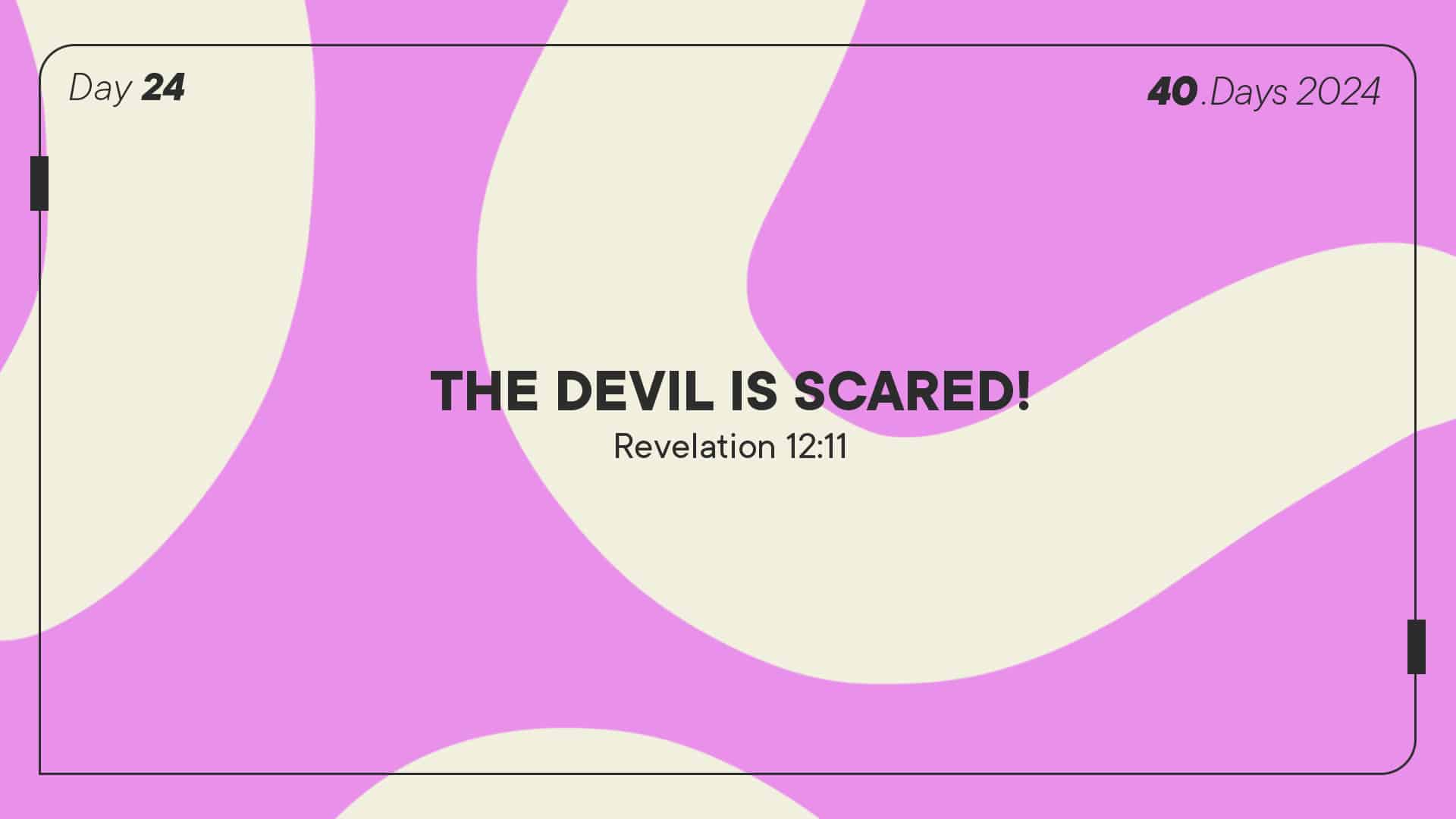My name is Amelia Ng. I cannot speak, move or breathe on my own. But I can pray.
The Faith, Love and Hope of Amelia Ng series honours the courage of all persons with disability and their faithful caregivers.
by Janice Tai // October 14, 2022, 4:40 pm
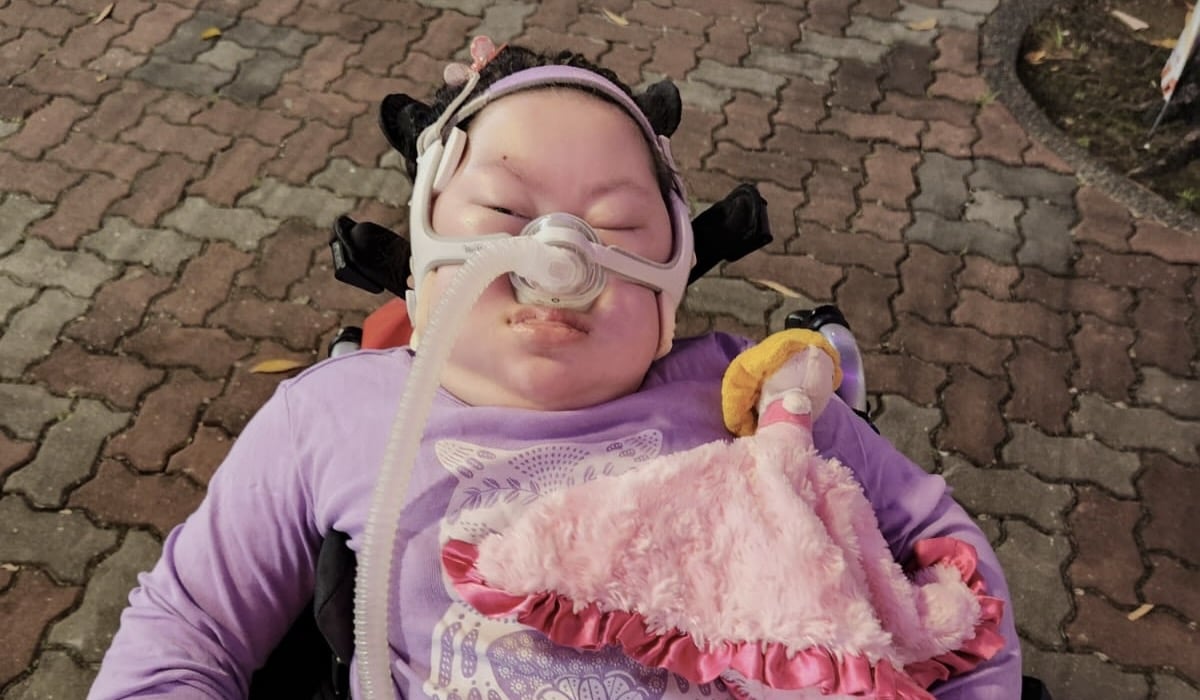
Amelia Ng, who has a rare neurological illness, can only communicate with her loved ones and palliative care nurse by blinking and swallowing. Videos by Thomas Franks. Pictures by Thomas Franks and Amanda Ng. Illustrations by Nicole Chan.
Amelia Ng, 16, cannot eat, speak or move. On some days, even opening her eyes and breathing can be difficult.
She is the first person in Singapore to be diagnosed with Infantile Neuroaxonal Dystrophy (INAD), a rare neurological disorder that causes progressive damage to the nervous system.
There are only about 150 children in the world with this condition. Many do not survive beyond their tenth birthday.
There are only about 150 children in the world with this condition. Many do not survive beyond their tenth birthday.
In this series of three stories – The Faith, Love and Hope of Amelia Ng – Salt&Light finds out what it is like to be Amelia, and how the bedridden teenager thinks, communicates and, yes, prays.
“Okay, let’s pray? Who do you want to assign to pray?” Mum Wendy Loh, 47, asks her daughter, Amelia, during their weekly family devotion time after dinner.
It would have been a relatively easy question to answer if Amelia had been like any other 16 year old.
Amelia, however, cannot speak. The teenager is bedridden and hooked up to a ventilator 24/7 in order to be kept alive.
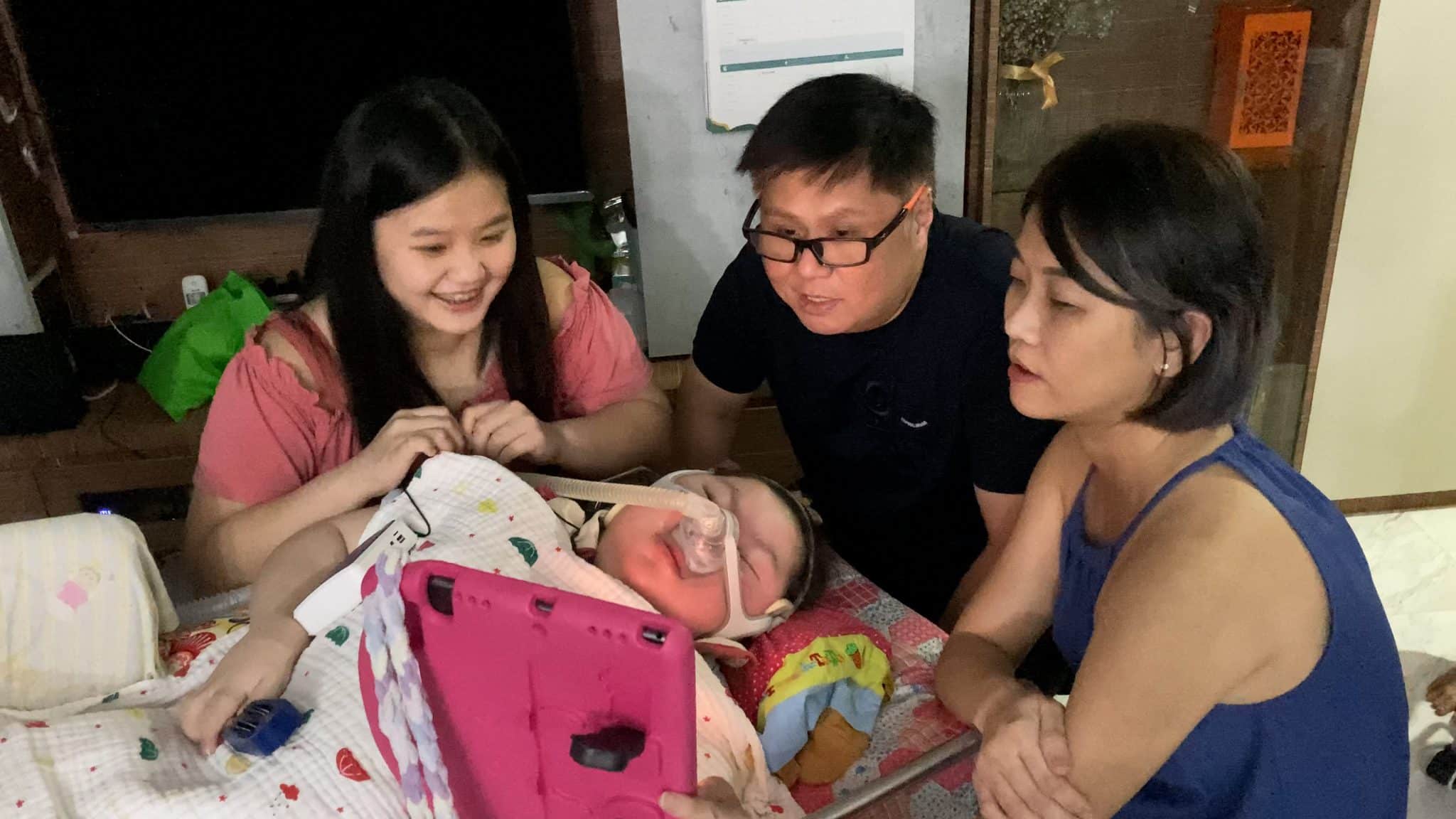
The Ng family reading Bible verses on the iPad as part of their weekly family devotion time, which goes on to include a time of prayer.
But these obstacles do not faze her family members, despite their having seen Amelia’s steady deterioration from the age of two, when she could at least utter the words Mama, Papa and Jie Jie to her parents and sister.
A rare and terminal disorder
Children with infantile neuroaxonal dystrophy (INAD) inherit a gene mutation that causes lipids to build up on nerves. It affects nerve signals, leading to a gradual loss of muscle control, vision, speech and intellectual development.
Having INAD meant that she slowly lost every ability that she once had: Crawling, sitting up, urinating, eating and speaking. There is currently no cure for this progressive and terminal condition.
The family used to be able to tap on technology, communicating with Amelia using a machine that detects the movement of her eye gaze. Depending on whether Amelia wanted to have a nap or watch TV, she could move her eyes to the correct word or pictorial option on a screen in front of her to make her preferences known.
Two years ago, even the ability to move her eye muscles and focus her gaze on something long enough for her choices to be detected was taken away.
As the family has experienced loss upon loss, they have also chosen to lovingly and painstakingly find out what Amelia can still do and how she can still express herself.
The swallowing of saliva. The blinking of eyes. The fast fluttering of eyelids. The slight frown on her forehead. The widely-opened eyes. The “mmm-mmm” throaty sounds of vocalisation.
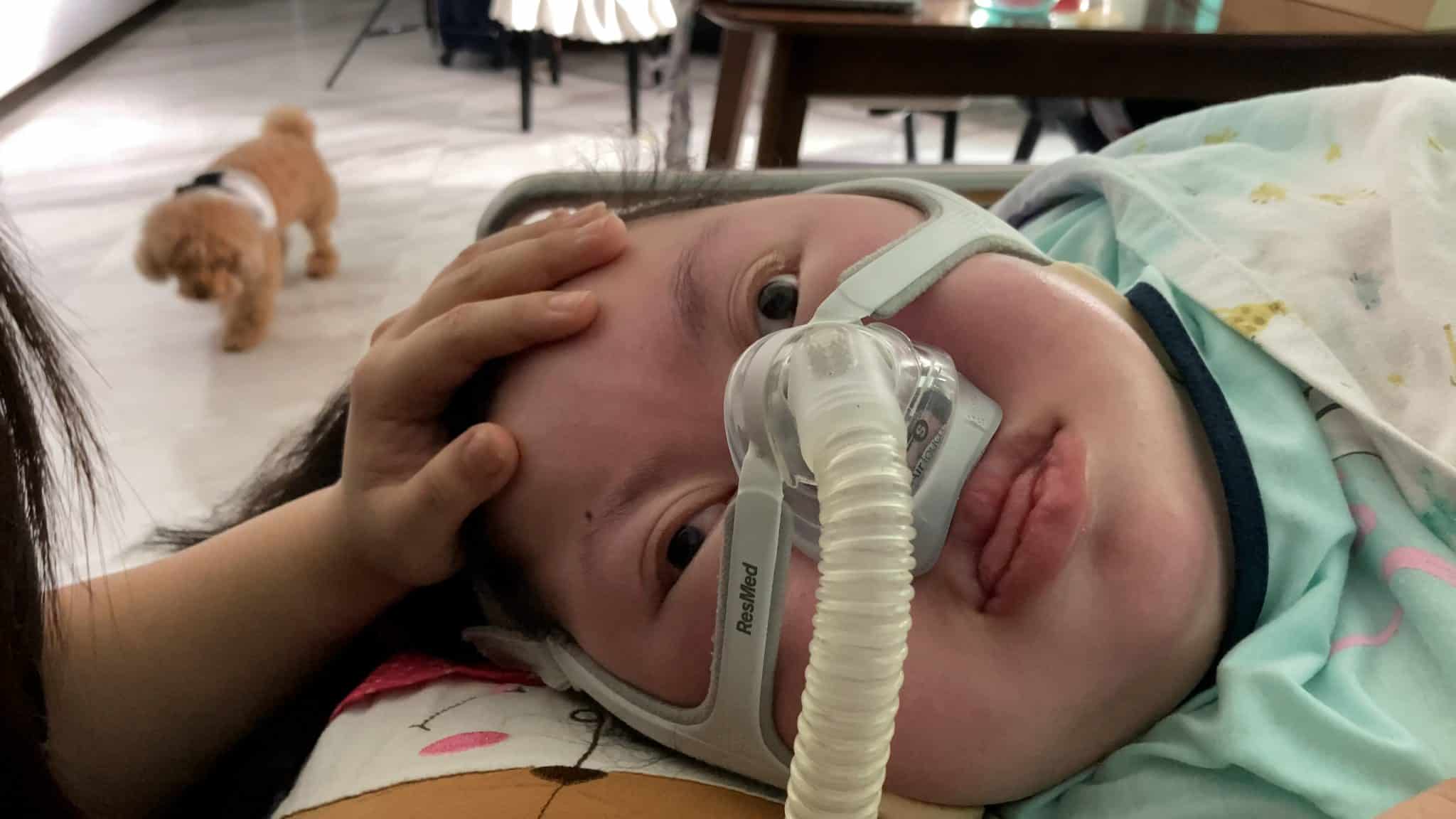
There are times when Amelia opens her eyes widely to express interest, fear or other emotions. But often her eyes are shut; she is losing control of even the muscles on her eyelids.
Each subtle movement tells a story and reveals Amelia’s desire to connect, to be heard, to be seen.
So, her family continues to speak to her normally.
Prayer warrior from her bed
“Who do you want to lead the prayer time?” Mum asks Amelia again.
“Mummy?”
All of them – Mum, Dad Kin Nam and her sister Amanda – lean towards Amelia and peer at her face to check her answer.
No response.
“Who do you want to lead the prayer time?” Mum asks Amelia.
“Daddy?”
No response.
“Jie Jie?”
No response.
Puzzled, they look around. There was no one else around who could pray. Unless …
“Amelia, you want to pray?” her mother hazards a guess.
Swallows (indicating “yes”).
All of them try not to show the surprise they feel (this has never happened before), and go along with her decision.
“Hmm, so you will pray, and we will all close our eyes. When you are done, you make a sound for ‘Amen’ so that we know when to open our eyes, okay?” Mum Wendy, who is leading devotion that night, quickly takes charge and issues the instructions.
Swallows.
Amelia has given the go-ahead.
Everyone dutifully bows their heads and closes their eyes.
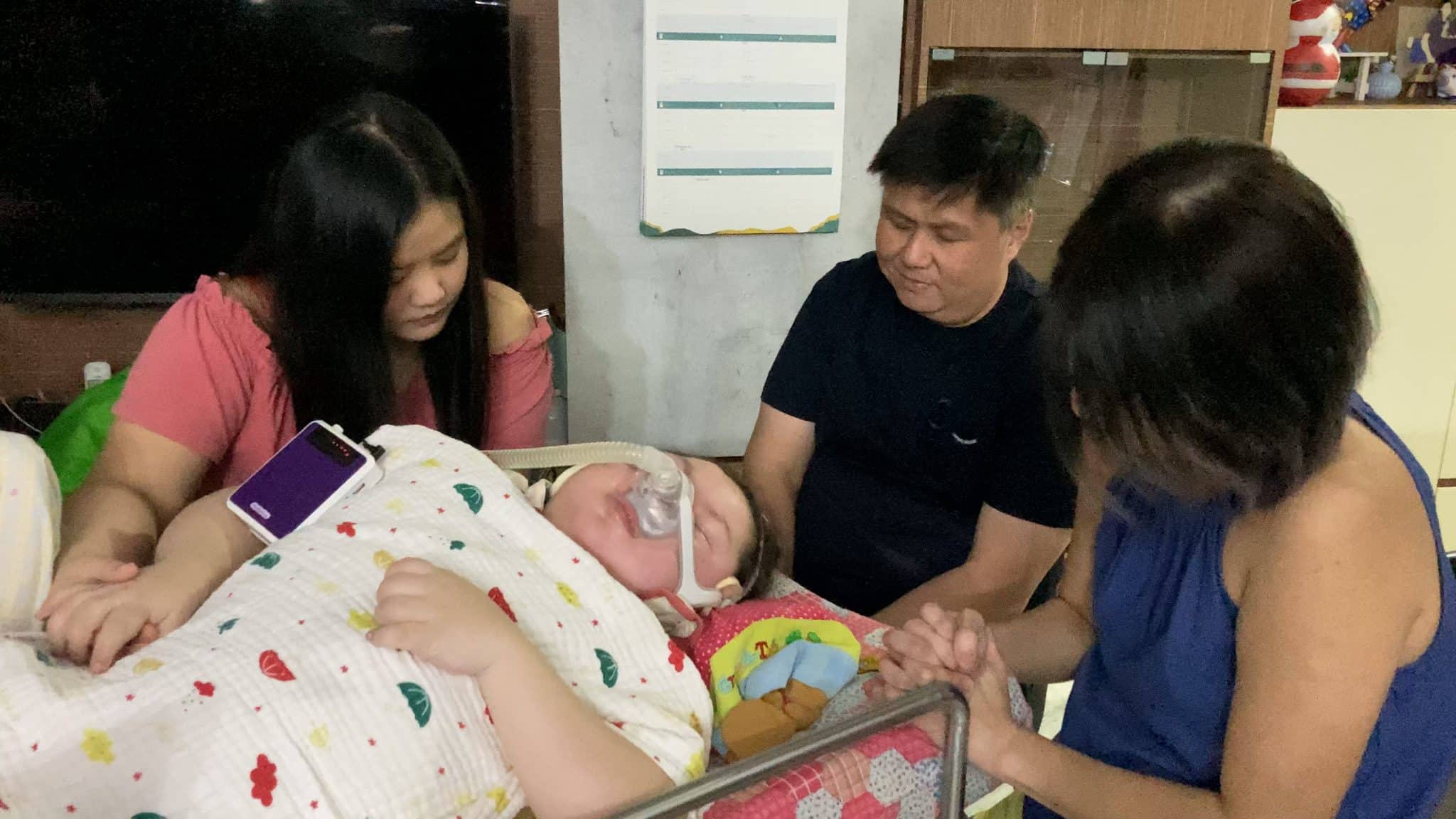
The Ng family goes into a time of silence as Amelia leads the prayer time.
After five minutes of praying and sitting in silence, Mum cannot resist breaking the silence.
“You don’t fall asleep ah,” she reminds Amelia, who has yet to indicate the closing of prayer time.
“Mummy, it seems you have a problem of keeping still,” Amanda, 19, gently chides her mother.
Everyone continues to close their eyes and sit in silence as Amelia continues praying.
Amanda notices that her sister is indeed deep in prayer, with her eyes completely closed and her body unusually still.
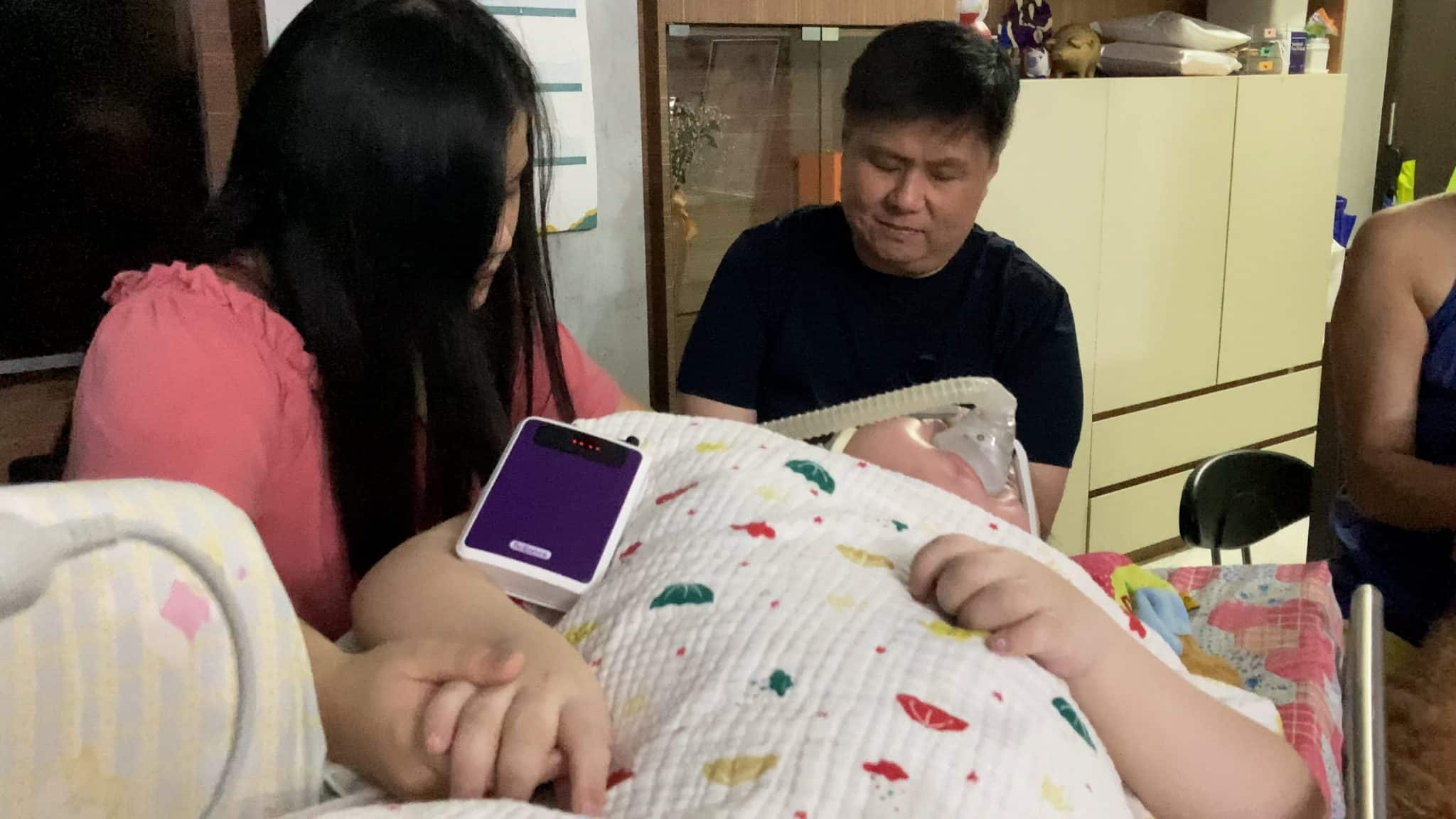
Amidst the silence, Amanda can sense that her sister is deep in prayer as she is unusually still.
Ten minutes passes, and her mother blurts out to Amelia again: “Are you still praying?” adding sheepishly: “I think I do have a problem of being still.”
By now, all of them have opened their eyes and are looking around.
“Let’s say Amen?” her mother suggests.
Mmm-mmm, Amelia goes. It seems to be her way of not only saying “Amen”, but also vocalising her frustration over being rushed to finish praying.
“So, you wanted to pray more so that we will learn to be still?” her mother asked.
Blinks.
It is a lesson for the family, indeed.
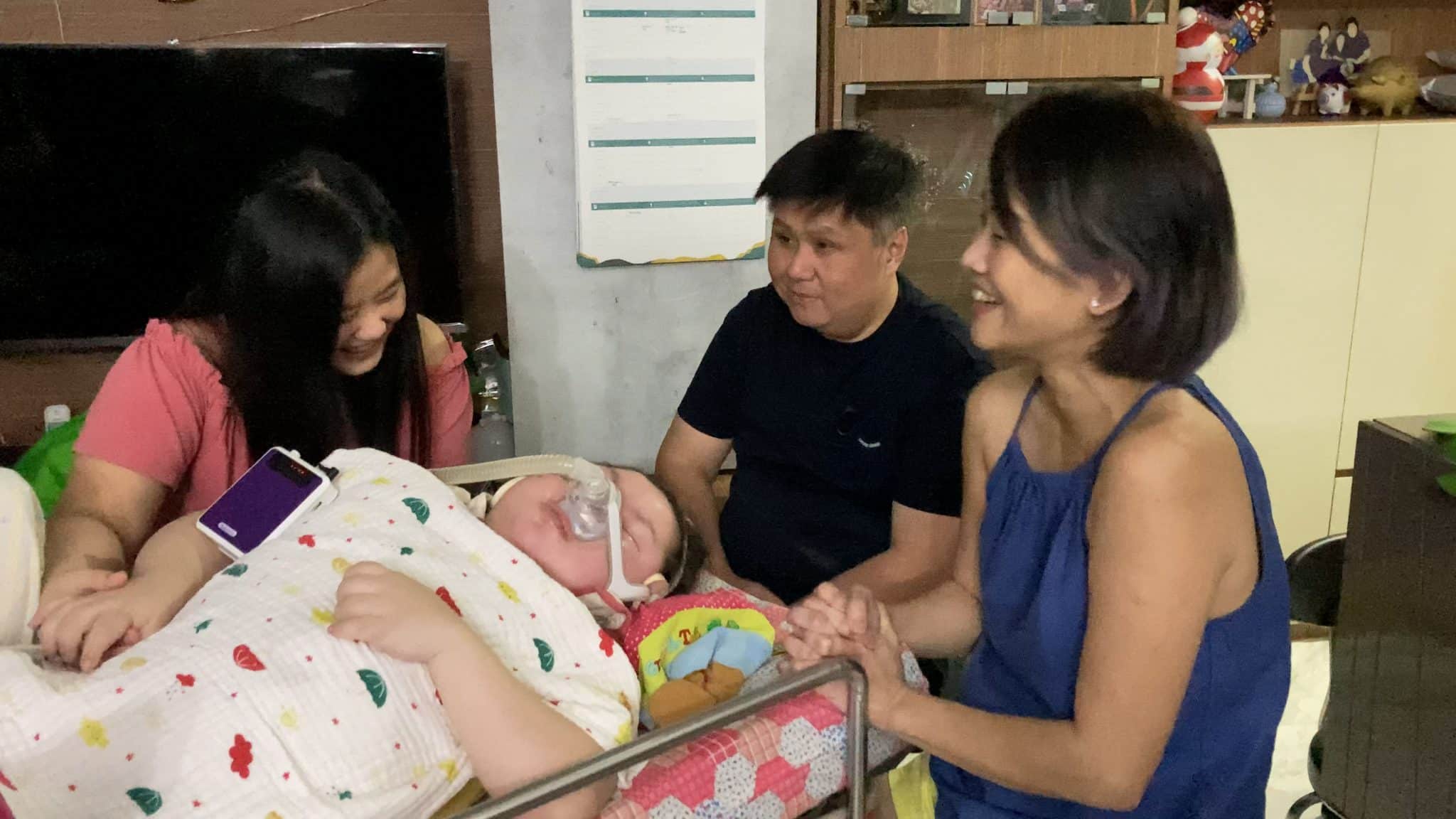
The family shares a lighthearted moment after the silence is broken during the prayer time led by Amelia.
Even in her bedridden state, Amelia has just modelled for her family how to be still when they approach God in prayer.
Who else can best teach her family this lesson of faith, other than someone who is immobile and lying on a bed for interminable hours?
Yet Amelia has learnt that being still is more than a lack of movement. It is a state of the mind and the heart.
“Sometimes I think that she must be feeling so bored, lying there all the time, with nobody to talk to her, especially when we are busy,” says Amanda.
“But I have noticed that even if she seems to be staring into blank space, she is actually so entertained and occupied when she prays and talks with God.”
A few months ago, for instance, Ted – the family’s poodle – had to go for eye surgery.
Though Amelia does not really like the family’s two dogs because they cannot replace her late dog, Amber, she still considers Ted family. So, she was constantly worried about Ted during that time.
Amelia’s palliative home care nurse from HCA Hospice, Poh Ya Nee, sensed the change in mood in Amelia and tried asking her who she was worried about. After going through a long list of names and not getting any response, she finally realised that Amelia was worried about the dog.
Every night, Amelia would refuse to sleep until the family gathers to pray for Ted.

Ted, the family’s adopted toy poodle.
As Amelia talks to God about many things, including Ted, He reveals His mysterious secrets to her.
Recently, when this writer asked Amelia what she likes about family devotion time, she did not respond when options of prayer and worship songs were suggested.
“Or you enjoy just wanting to see what God is showing you?” this writer hazarded a guess.
Fluttering of the eyelids.
The answer is clear.
“So, what has God been showing you lately?” was a natural follow-up question.
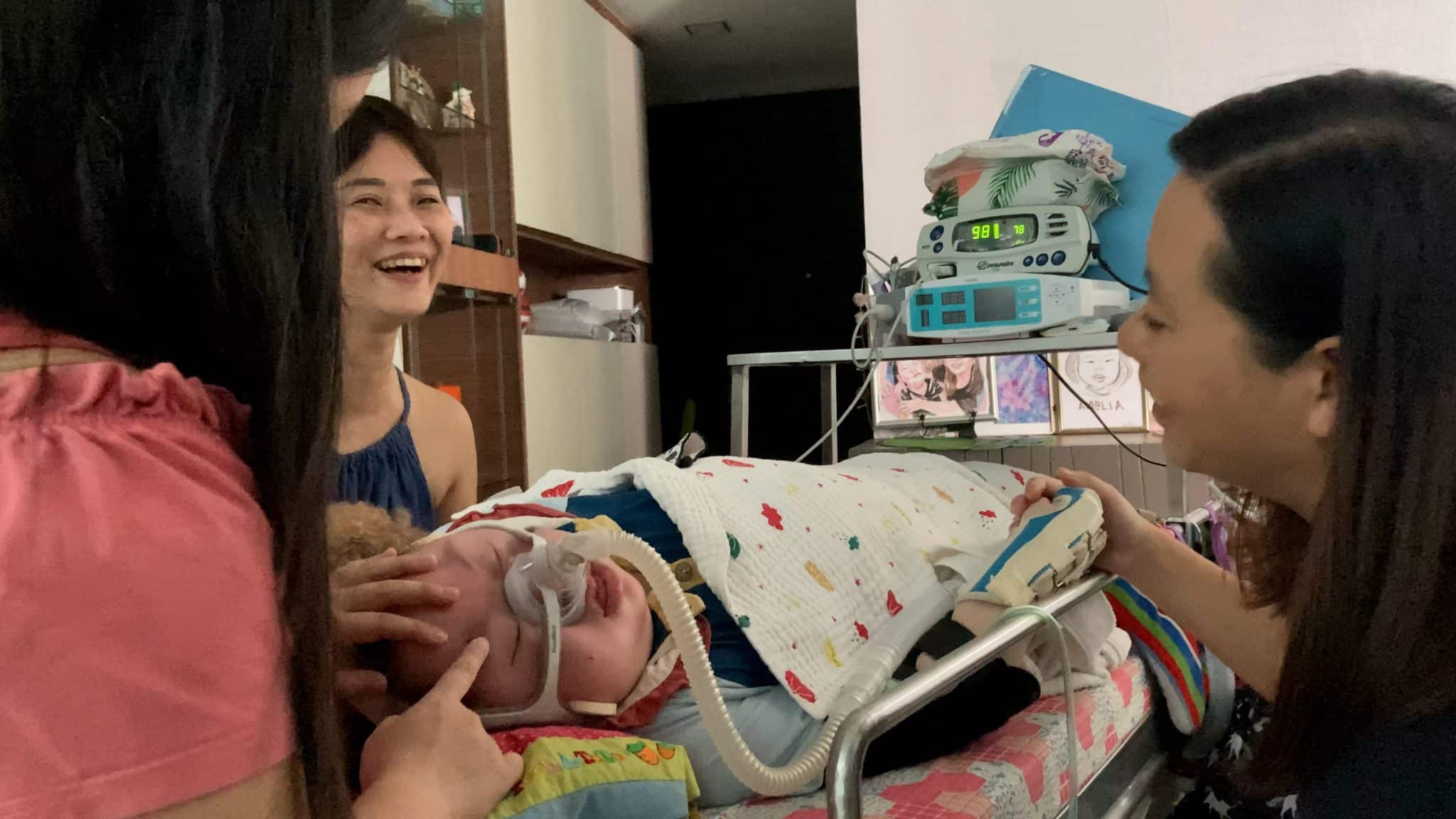
As the Salt&Light writer asks Amelia questions on her faith, her sister, Amanda, uses her hand to gently move Amelia’s forehead upwards so that her eyes open more widely and her responses to the questions are more discernible.
Her mother and sister sighed at the fielding of such an open-ended question, knowing that it would be hard to try to suggest the correct answer from a sea of endless possibilities.
“I had to learn her language; it is just like learning another language, like Japanese or English.”
After throwing out various random answers (Show you about your birthday party? About who He is?), she finally responded to the intriguing question of: “Show you what heaven is going to be like?”
Fluttering of the eyelids.
Of course, further questions ensued. So, what is heaven like?
With the fluttering of her eyes, she indicated that she did not yet see “children”, “Amber” (their previous poodle who had died), “angels” or “choir singing songs”.
However, she did see “milk and honey”, “strawberry”, “Jesus” and “many people”.
Says her mother: “I believe God has a special place in His heart for the children, especially special children like Amelia who cannot even speak. He continues to speak to her in different ways and she has that sensitivity to receive it.”
A language of her own
Over the last five years of caring for Amelia, palliative care nurse Ya Nee says she has managed to pick up Amelia’s special way of communication – the eye blinks, swallows and frowns.
“I had to learn her language; it is just like learning another language, like Japanese or English. Of course, there are people who question and ask if we are thinking too much or reading too much into her expressions,” says Ya Nee.
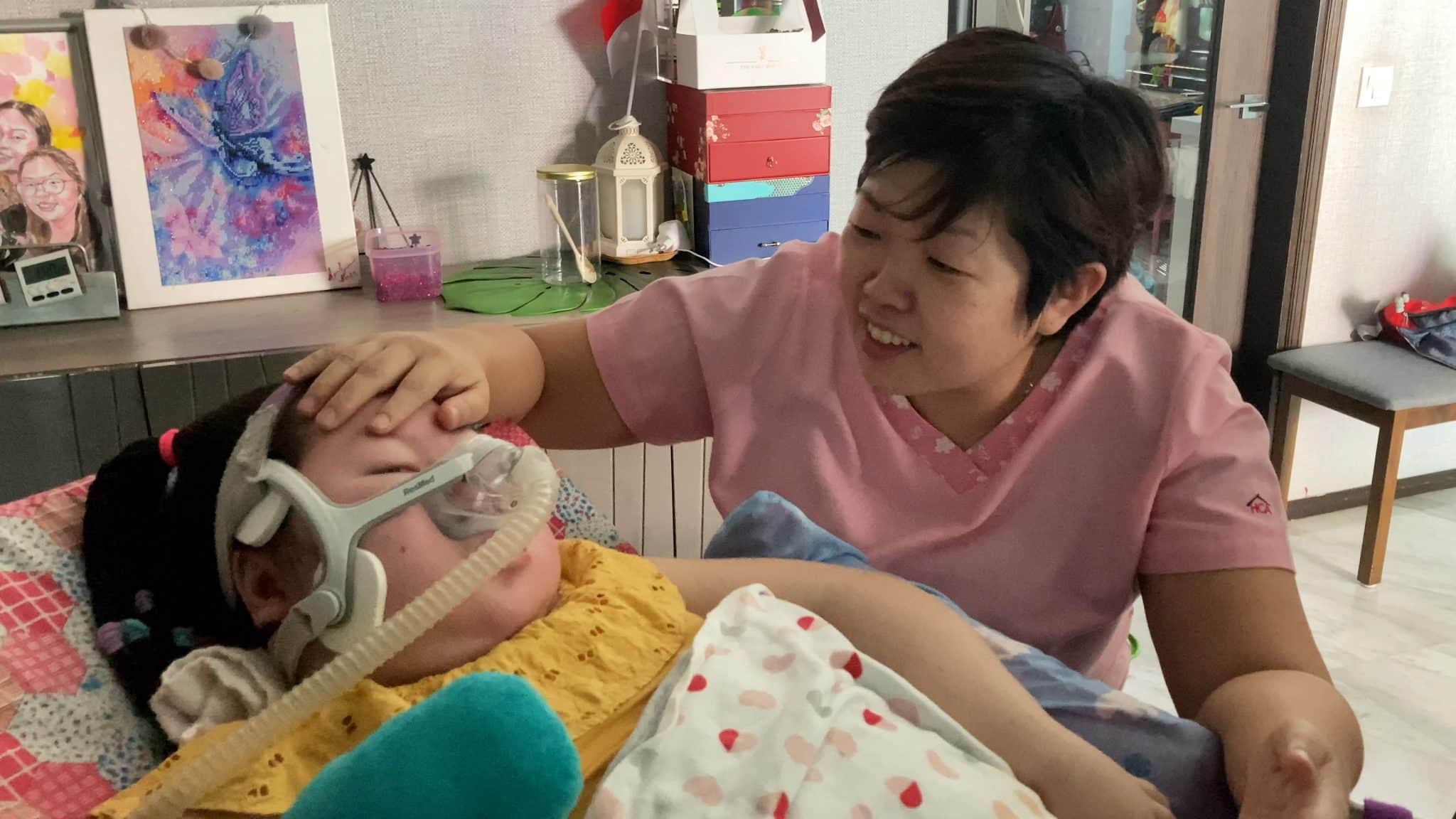
Palliative care nurse Ya Nee from HCA Hospice has been checking in on Amelia at least once a month for the past five years.
“But if you really get to know Amelia, you know that she is able to have complex reasoning, understanding and emotion processing, despite her deterioration. It is we who need to have the patience and desire to hear her,” she adds.
Knowing that Amelia has an intimate relationship with God, Amanda does not go easy on her sister when it comes to discipleship.
The first confirmation that reassured the family that Amelia has cognitive ability and understanding was when they first heard her “voice” through the eye gaze machine five years ago.
“Amelia was very excited that she could finally have another way to show us how she felt or what she was thinking about,” said Amanda. “I was moved when I heard her say ‘I love you’ to me, or when she used her eyes to open up Google Assistant to ‘sing’ the happy birthday song to wish her doctor.”
One way nurse Ya Nee learns to differentiate involuntary blinks and swallows from Amelia’s actual intentional responses is to ask the same question in different ways, or to come back to ask the same question again after speaking to her about other things. She knows she has Amelia’s true response when she gets consistent answers from her.
“She is capable of higher-level thinking, but the challenge is for us to learn how to reframe an open-ended question into a series of closed ‘yes’ or ‘no’ type of questions so that she can respond,” Ya Nee tells Salt&Light.
Knowing that her sister has an intimate relationship with God, Amanda does not go easy on her sister when it comes to discipling her in the Bible study sessions.
After all, Amelia has grown in knowledge of the faith and Bible from the years of going to church before Covid-19 struck. She used to attend Sunday School, and then followed her parents to the main service when her disability became more severe and she had to be wheeled in.
During Bible study time at home, Amanda not only makes sure her younger sister follows the reading of the verses, but also understands its meaning and symbolism.
While Amanda was doing a Bible study-cum-craft session with her sister one Friday afternoon, for instance, they read the chapter of Esther 5 which describes how the King held out to Esther the gold sceptre that was in his hand.
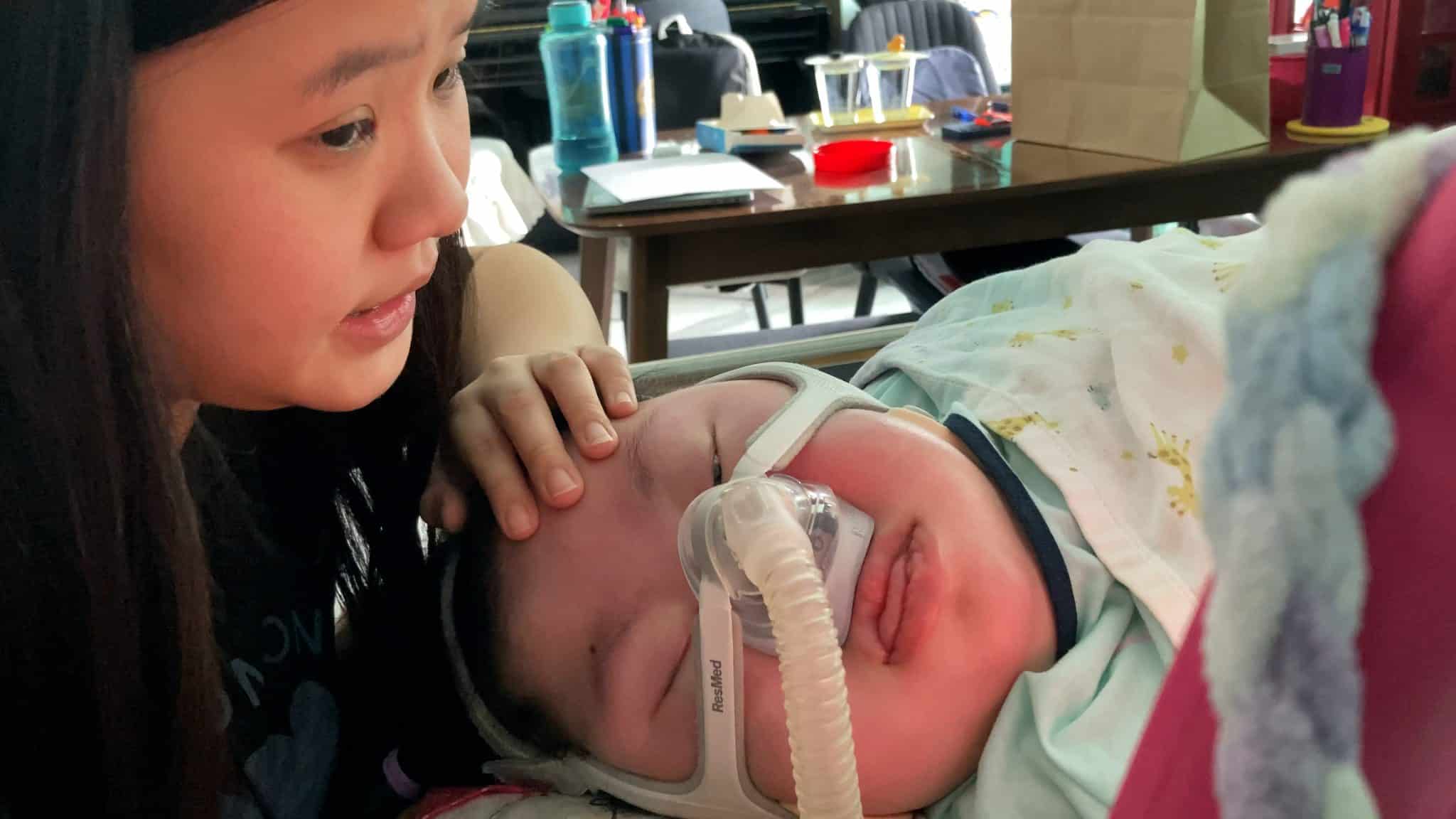
Amanda reading to her sister the Scripture chapter for the day – Esther 5 – from an iPad.
“You remember what’s the sceptre for?” Amanda asked her sister.
Eyes flicker.
“Yes, we went through that last week. It’s to signal the King’s acceptance and approval towards Esther, so that she knows she is not in danger when seeking an audience with him,” Amanda said encouragingly.
While God speaks to Amelia through prayer and the Word, she hears Him most clearly when she worships Him through songs.
Whenever she hears a song that speaks to her, such as Fear No More by The Afters, her eyes open widely and her heart rate shoots up from the usual 80 to almost 100 beats per minute.
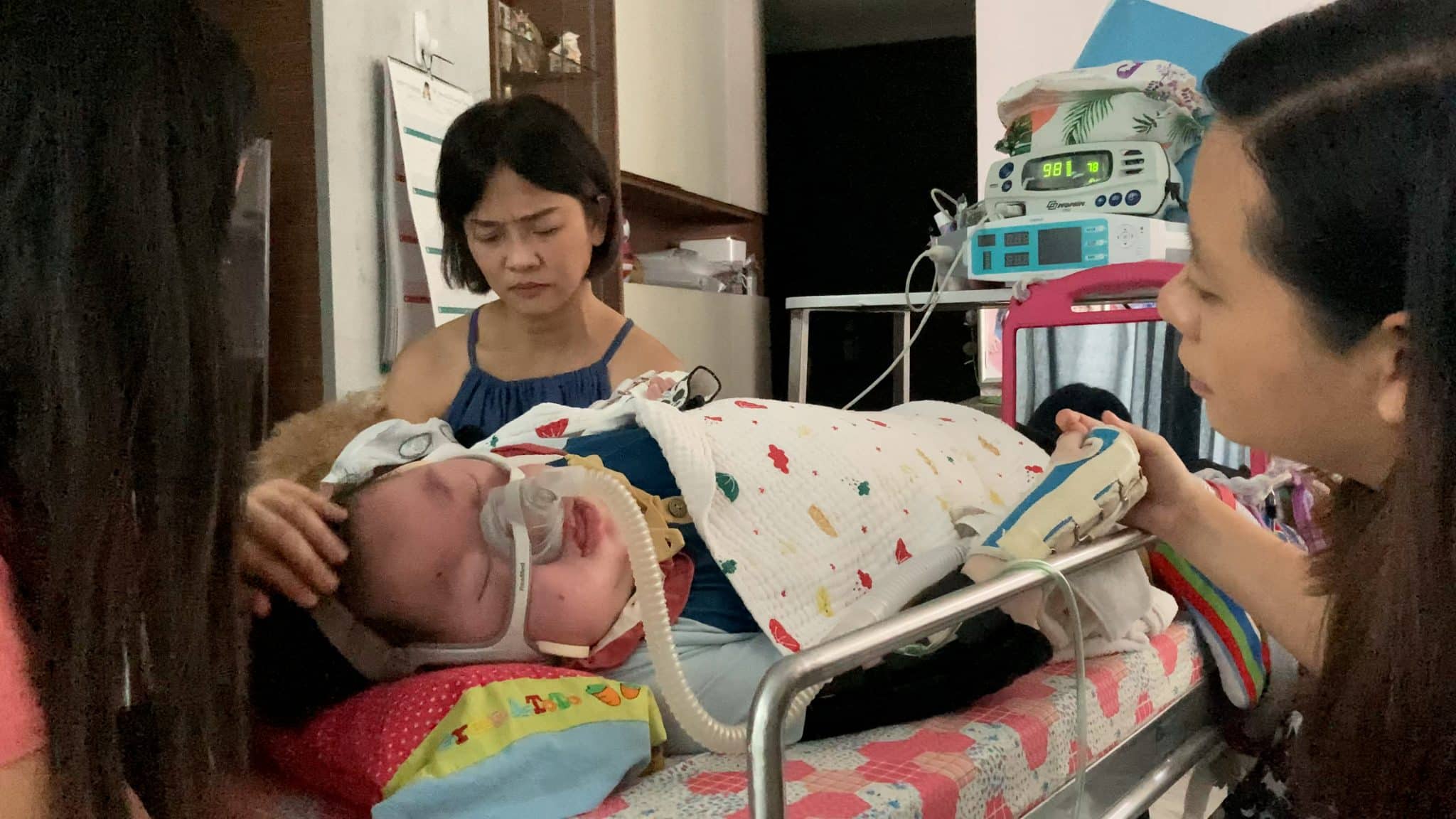
Amelia’s heart rate shoots up to almost 100 beats per minute (shown on the screen in front of her) while worshipping God with the song, Blessings, by Laura Story.
While spending some time together with her two daughters on a Monday afternoon, Wendy chooses the song “Blessings” by Laura Story, for them to sing.
As Wendy and Amanda sing the song softly, Amelia also starts joining in.
Mm-mm. Mmmm-mmmm. She hums to the tune.
Three parts of the song seem to resonate with her.
“Is living on earth hard for you?”
What if Your healing comes through tears?
What if a thousand sleepless nights
Are what it takes to know You’re near?
Eyelids flutter.
We doubt Your goodness, we doubt Your love
As if every promise from Your Word is not enough
Eyelids flutter.
We know that pain reminds this heart
That this is not, this is not our home
It’s not our home.
Eyelids flutter.
To her family members, it is clear why Amelia “sings” these lines with intensity.
She knows what it is like to have sleepless nights; for years, she has only managed to have just a few hours of restless sleep each night.
Her mother, feeling her daughter’s pain, tries to control the sobs which shake her frame as the song plays on.
At the end of the song, a lone tear drips from the crease of Amelia’s left eye.
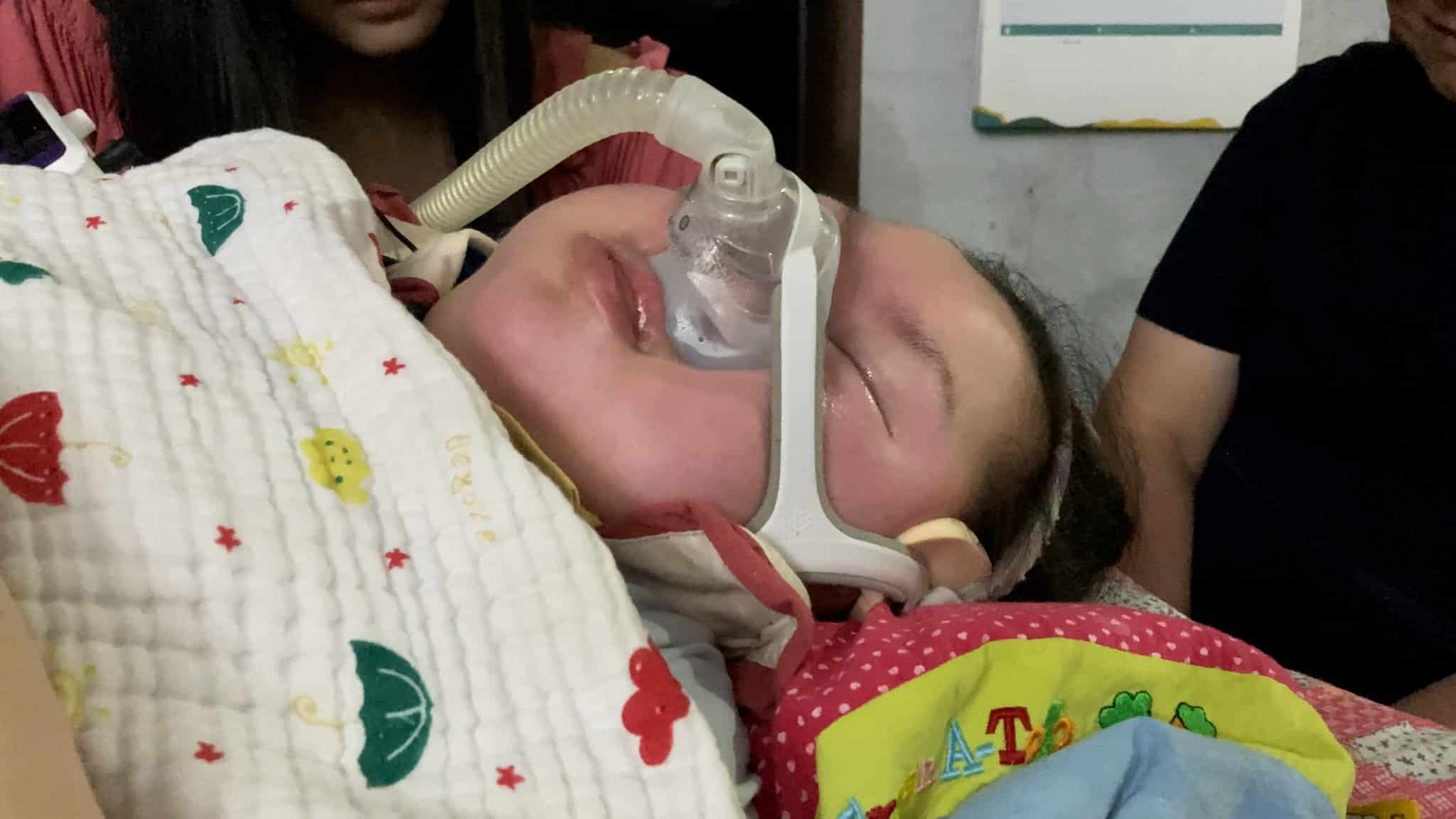
A lone tear falls from Amelia’s eye after she “sings” the worship song, Blessings.
It is the first time in a long time that her mother has seen her tear up. It surprises her; she’d thought that her daughter can no longer cry.
Later on, her mother asks her: “Is living on earth hard for you?”
Amelia does not respond, which generally means “no”. Yet the aversion of her gaze is obvious; she is no longer looking at her mother.
“I don’t know if she really means it,” confides her sister, Amanda. “Perhaps she is just being her thoughtful self, and does not want to upset Mummy.”
Despite her severe disability, it appears that Amelia relates to God in ways similar to other believers – through prayer, His Word and worship songs.
God is near in life-threatening moments
However, unlike many of us, Amelia has indicated that she has seen God.
The family has found themselves facing such near-death incidents countless times.
Not through dreams in the night or visions in the day, but during the moments when she turns blue.
Turning blue, as the term suggests, indicates the sudden episodes when, due to various reasons, Amelia’s oxygen levels drop drastically, putting her at risk of brain damage or death.
Recently, in early September, she and her family went through such an ordeal.
They had brought Amelia out for a short outing at Suntec City. When they returned home, Amelia was exhausted and was already sleeping in her special wheelchair.
Her father tried to transfer her from the wheelchair to her customised bed.
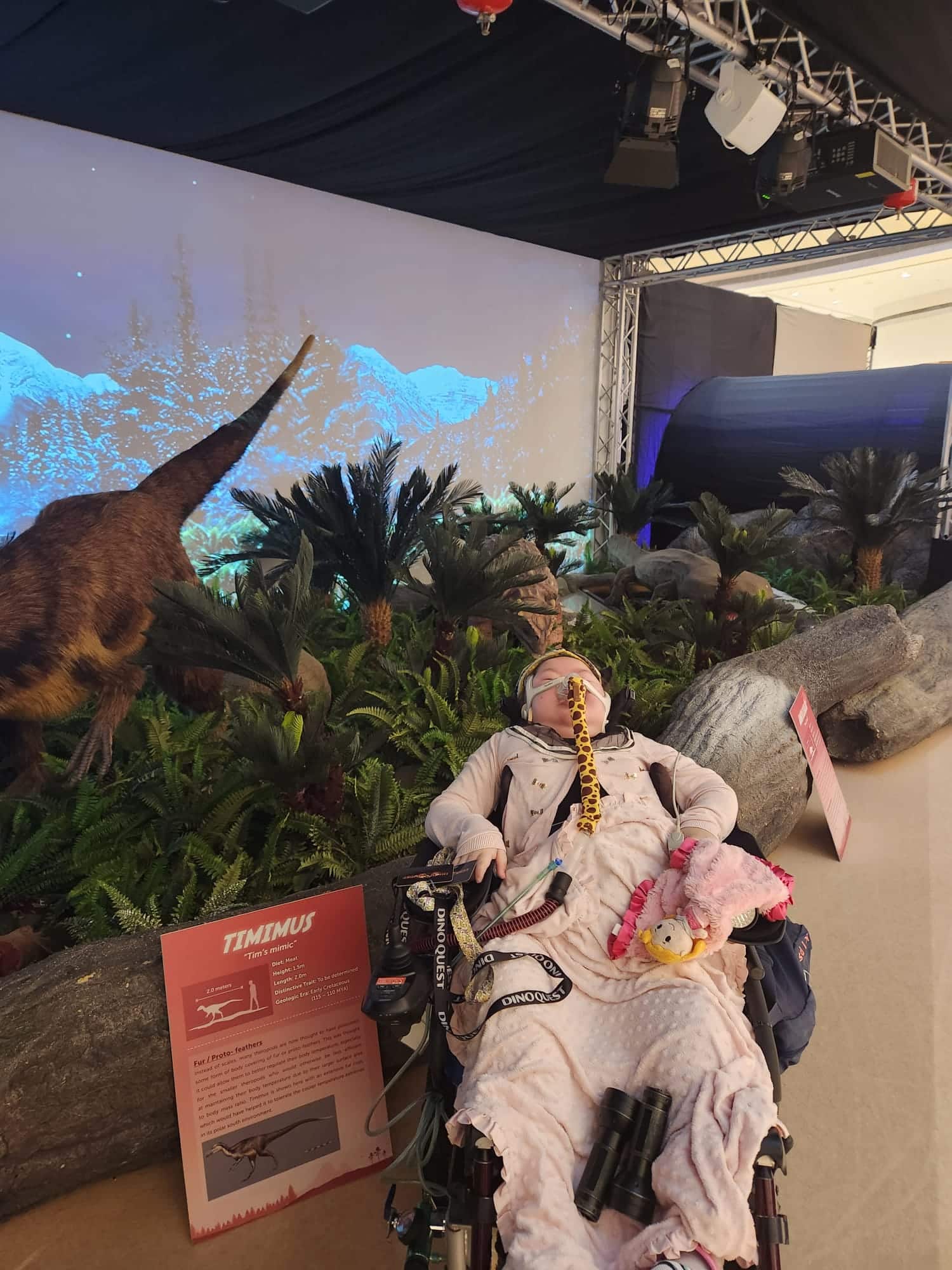
The Ng family took Amelia to DinoQuest, a dinosaur exhibition at Suntec City, last month.
Perhaps the transition shocked her and she awoke during the time of the transfer, and the alarm of her ventilator began beeping continuously as her oxygen levels on the screen in front of her plunged dangerously, from 90 to 80, 70, 60, 50, 40 and 30.
It is during these intense moments that she feels God’s presence the most.
Amelia’s face turned blue, her fingers became pale and her eyes were flung wide open in panic.
Her sister, just three years older, made the judgement call of not removing her oxygen mask to do manual resuscitation as the risk of losing her sister by doing so may have been greater.
Thankfully, after a few harrowing minutes, her sister’s oxygen levels started climbing back up.
The family has found themselves facing such near-death incidents countless times.
This year, however, they have “only” had three such episodes.
Yet, it is during these moments that Amelia says she “sees” God.
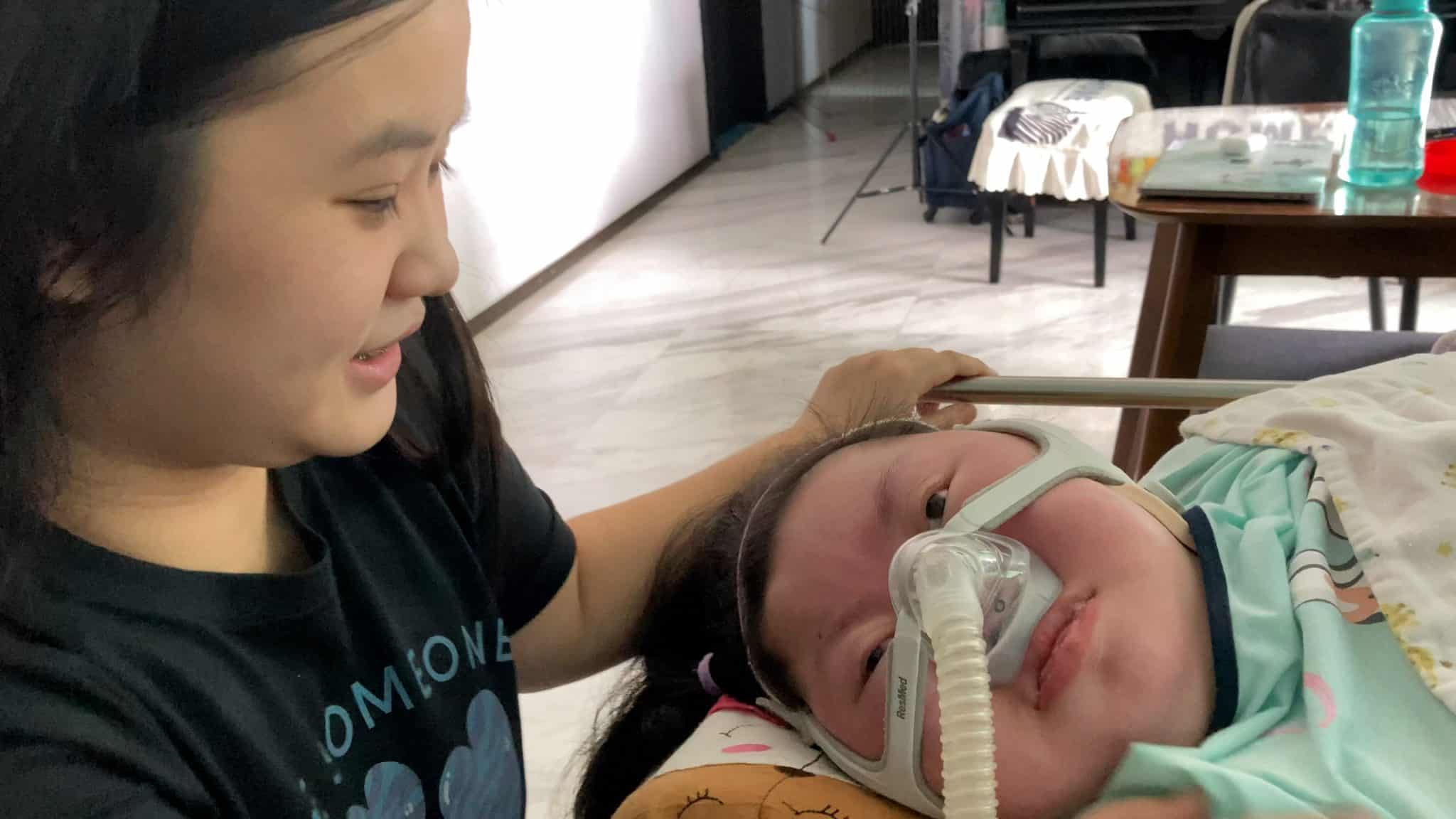
Amanda “chats” with her sister by asking questions and looking out for her responses.
“You can’t see His face or what He is wearing?” her sister asks.
Eyes flicker.
Amelia’s plight – and her faith – have prompted her backslidden mother and unbelieving father to go back to church.
“But you can feel or sense Him?”
Eyes flicker.
It is during these intense moments that she feels God’s presence the most.
It is also these moments that have prompted her backslidden mother and unbelieving father to go back to church, and prompted her sister to pray more.
It is no wonder then, that one of Amelia’s favourite Bible verses is Isaiah 43:2:
When you pass through the waters,
I will be with you;
and when you pass through the rivers,
they will not sweep over you.
When you walk through the fire,
you will not be burned;
the flames will not set you ablaze.
Read about the moving Love and Hope of terminally ill Amelia Ng.
We are an independent, non-profit organisation that relies on the generosity of our readers, such as yourself, to continue serving the kingdom. Every dollar donated goes directly back into our editorial coverage.
Would you consider partnering with us in our kingdom work by supporting us financially, either as a one-off donation, or a recurring pledge?
Support Salt&Light

